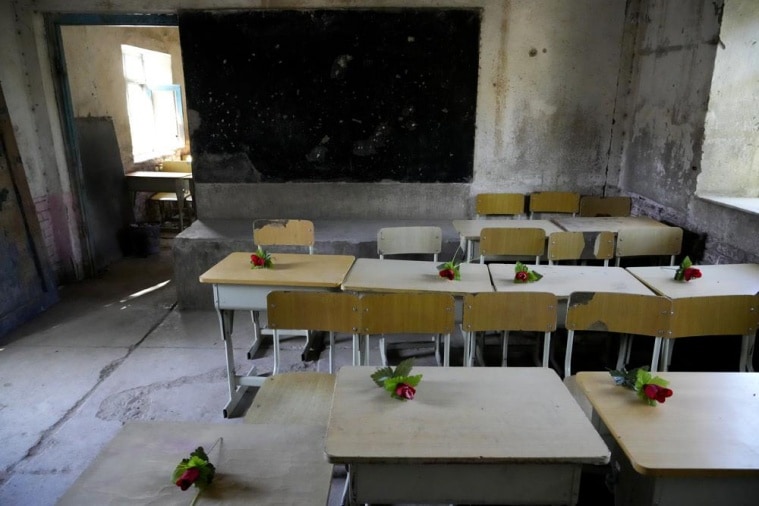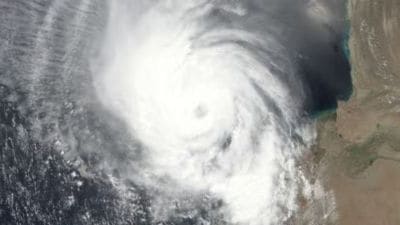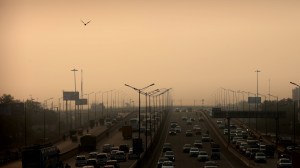Stay updated with the latest - Click here to follow us on Instagram
Militants in Afghanistan strike Pakistan army post, kill 3
It comes as Afghanistan is reeling from a series of explosions in recent days, including the bombing of a mosque in northern Kunduz province on Friday that killed 33 people, including several students of an adjacent religious school or madrassa.
 A wounded man receives treatment in a hospital, after a bombing at a mosque in the town of Imam Saheb, in Kunduz Province in north of Kabul, Afghanistan, Friday, April 22, 2022. (AP Photo/Abdullah Sahil)
A wounded man receives treatment in a hospital, after a bombing at a mosque in the town of Imam Saheb, in Kunduz Province in north of Kabul, Afghanistan, Friday, April 22, 2022. (AP Photo/Abdullah Sahil)Militants in Afghanistan fired heavy weapons across the border into a Pakistani military outpost overnight, killing three personnel, the army said Saturday, in the latest violence to rattle the volatile region.
A firefight ensued with the militants firing toward the army post in Pakistan’s rugged North Waziristan region, and several were killed, the statement said. There was no immediate way to independently confirm details of the attack.
 A wounded man receive treatment in a hospital, after a bombing at a mosque in the town of Imam Saheb, in Kunduz Province in north of Kabul, Afghanistan, Friday, April 22, 2022. A Taliban official says a bombing at a mosque and religious school in northern Afghanistan on Friday killed at least 33 people, including students of a religious school. (AP Photo/Abdullah Sahil)
A wounded man receive treatment in a hospital, after a bombing at a mosque in the town of Imam Saheb, in Kunduz Province in north of Kabul, Afghanistan, Friday, April 22, 2022. A Taliban official says a bombing at a mosque and religious school in northern Afghanistan on Friday killed at least 33 people, including students of a religious school. (AP Photo/Abdullah Sahil)
It comes as Afghanistan is reeling from a series of explosions in recent days, including the bombing of a mosque in northern Kunduz province on Friday that killed 33 people, including several students of an adjacent religious school or madrassa.
The striking increase in attacks in Afghanistan – as well as in neighbouring Pakistan – highlights the growing security challenge facing Afghanistan’s Taliban rulers, who swept to power last August in the closing days of the chaotic withdrawal of American and NATO troops ending their 20-year war.
Even as their harsh religiously motivated edicts, which seemed reminiscent of their late 1990s rule, drew harsh criticism, their seemingly heavy-handed approach to security brought early expectations of improved safety.
 Afghan students hold rose on the first day of school after Tuesday’s explosion in front of their school, in Kabul, Afghanistan, Saturday, April 23, 2022. On Saturday, the Abdul Rahim Shaheed School, which was among the IS-K targets in the Tuesday attacks, re-opened. The school’s principal handed each student a pen and a flower as they began classes on Saturday. (AP Photo/Ebrahim Noroozi)
Afghan students hold rose on the first day of school after Tuesday’s explosion in front of their school, in Kabul, Afghanistan, Saturday, April 23, 2022. On Saturday, the Abdul Rahim Shaheed School, which was among the IS-K targets in the Tuesday attacks, re-opened. The school’s principal handed each student a pen and a flower as they began classes on Saturday. (AP Photo/Ebrahim Noroozi)
However a vicious Islamic State affiliate known as the Islamic State in Khorasn Province, or IS-K – which claimed the recent spate of attacks in Afghanistan as well as a growing number in neighbouring Pakistan – is proving an intractable challenge.
IS-K took responsibility for a series of attacks across Afghanistan on Thursday, most of which targeted the country’s minority Shiites who the radical Sunni Muslim group revile as heretics.
Still, the IS-K, which is an enemy of Afghanistan’s Taliban rulers, is not the only militant organisation in Afghanistan contributing to the security dilemma facing Kabul’s religiously driven government.
The violent Pakistani Taliban, known as the Tehreek-e-Taliban Pakistan or (TTP) – which the United Nations says numbers around 10,000 in Afghanistan – has stepped up its assault on Pakistan’s military outposts from its Afghan hideouts.
Even the upstart IS-K has taken responsibility for some of the attacks targeting Pakistani military personnel, damaging relations between the two countries.
Afghanistan’s Taliban rulers have promised no militant group would use its soil as a base to attack another country, but Kabul has yet to arrest or hand over any TTP leaders in Afghanistan to Pakistan.
Other militant groups also operating in Afghanistan include China’s militant Uighurs of East Turkistan Movement, which seeks independence for northwest China, and the Islamic Movement of Uzbekistan (IMU).
 Roses are placed on empty desks as a tribute to students who were killed Tuesday’s explosion in front of the Abdul Rahim Shaheed School, in Kabul, Afghanistan, Saturday, April 23, 2022. (AP Photo/Ebrahim Noroozi)
Roses are placed on empty desks as a tribute to students who were killed Tuesday’s explosion in front of the Abdul Rahim Shaheed School, in Kabul, Afghanistan, Saturday, April 23, 2022. (AP Photo/Ebrahim Noroozi)
Some of the groups are loosely allied to the IS-K , while others act more independently, but on Saturday Pakistan’s military statement warned Afghanistan’s Taliban rulers to do more.
“Pakistan strongly condemns the use of Afghan soil by terrorists for activities against Pakistan and expects that the Afghan Government will not allow conduct of such activities, in future,” said the Pakistan military statement.
After seven of its troops were killed in an ambush earlier this month, Pakistan on April 16 retaliated with bombing raids inside Afghanistan that locals in Afghanistan’s eastern Khost province said killed dozens of refugees.
The United Nations Education Fund (UNICEF) confirmed 20 children were killed in the strikes in Afghanistan’s border provinces of Khost and Kunar. Meanwhile on Saturday the Abdul Rahim Shaheed School, which was among the IS-K targets in the Thursday attacks, re-opened. As many as seven students were killed in the attacks.
The principal handed each student a pen and a flower as they began classes on Sunday.




- 01
- 02
- 03
- 04
- 05



























